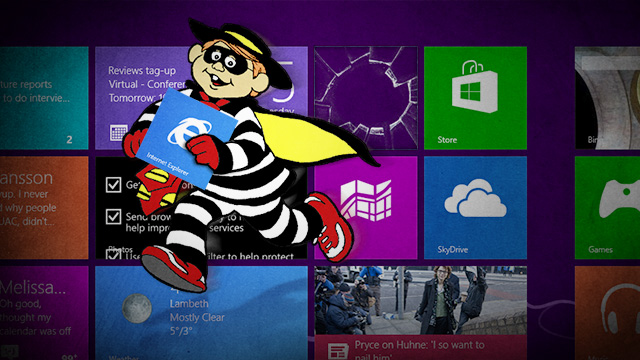
Browser security took a drubbing during the first day of an annual hacker contest, with the latest versions of Microsoft's Internet Explorer, Google's Chrome, and Mozilla's Firefox all succumbing to exploits that allowed attackers to hijack the underlying computer.
The Pwn2Own contest, which is sponsored by HP's Tipping Point division, paid $100,000 for the successful exploitation of IE 10 running on a Surface Pro tablet powered by Windows 8. The attack was impressive because it was able to bypass a variety of anti-exploit technologies Microsoft has added to its flagship operating system and browser over the past decade. To succeed, researchers from France-based Vupen Security had to combine multiple attacks, a technique that is growing increasingly common.
"We've pwned MS Surface Pro with two IE10 zero-days to achieve a full Windows 8 compromise with sandbox bypass," the firm announced by Twitter on Wednesday.
Day 1 also saw the full compromise of Chrome 25 on Windows 7, another impressive feat because it also required contestants to bypass security defenses Google developers have invested considerable resources in. The exploit also fetched its creators $100,000.
"We showed an exploit against previously undiscovered vulnerabilities in Google Chrome running on a modern Windows-based laptop," the winning, two-man team from MWR Labs wrote in a blog post. "By visiting a malicious webpage, it was possible to exploit a vulnerability which allowed us to gain code execution in the context of the sandboxed renderer process. We also used a kernel vulnerability in the underlying operating system in order to gain elevated privileges and to execute arbitrary commands outside of the sandbox with system privileges."
Firefox and a browser plugin for Oracle's Java software framework were also felled, fetching contestants $60,000 and $20,000 respectively for the exploits. Several other applications, including Adobe's Flash and Reader programs and Apple's Safari browser, remained untouched during the first day. The contest runs through Friday.
Now in its eighth year, Pwn2Own wields big cash payouts and whitehat prestige to simulate the financial incentives found in decidedly less-ethical hacking environments. The ultimate takeaway has always been that no software package is immune to crippling exploits that allow attackers to surreptitiously install malware when end-users visit innocuous-looking websites. But as the contest has evolved, it has strived to forge a reward system that mimics the underground economy where blackhats buy and sell attacks.
While not precise, prizes are intended to reflect the relative difficulty of devising a working exploit for a given program running on a particular operating system. Rewards this year are:
- Web Browser
- Google Chrome on Windows 7 ($100,000)
- Microsoft Internet Explorer, either
- IE 10 on Windows 8 ($100,000), or
- IE 9 on Windows 7 ($75,000)
- Mozilla Firefox on Windows 7 ($60,000)
- Apple Safari on OS X Mountain Lion ($65,000)
- Web Browser Plug-ins using Internet Explorer 9 on Windows 7
- Adobe Reader XI ($70,000)
- Adobe Flash ($70,000)
- Oracle Java ($20,000)
Threat Post has additional color on the first day of Pwn2Own here.
reader comments
40